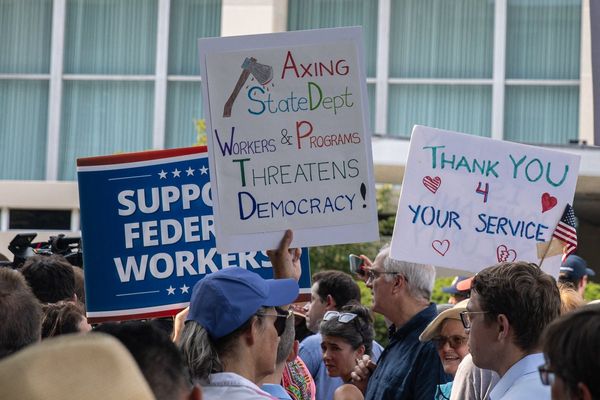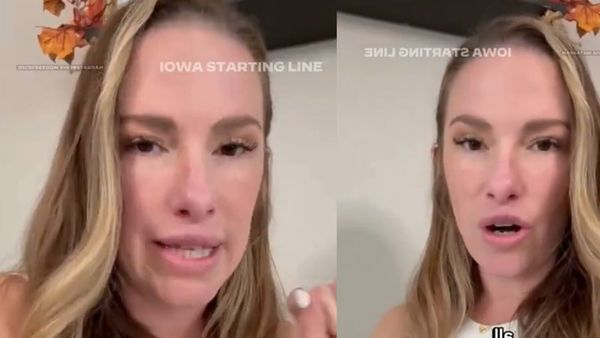
Not long after being released by US immigration officials in Del Rio, Texas, Diana was told there was a bus service waiting and her hopes lifted that she would be taken to her intended destination, where she could get work to fund her young daughter’s healthcare needs.
But when workers at the shelter near the US-Mexico border, where she and her daughter Danna, 10, were staying, showed the Colombian mother a map, she became worried. They were pointing to a city more than 80 miles (128km) away from Newark, New Jersey, where she hoped to join family members and wait for her immigration court hearing.
“They simply explained to me that there was a ride for free somewhere … and from there, we had to find our way,” Diana said, hugging Danna, who had been diagnosed as a newborn with retinopathy of prematurity, an eye disease that affects premature babies which has left her virtually blind.
They had few options so they boarded a bus provided by the authorities in Texas, where the right-wing Republican governor last year started transporting asylum seekers to northern, Democratic-led cities without coordinating with the destinations, dropping them off in New York, the street outside vice-president Kamala Harris’s residence in Washington and Chicago.
Diana, 37, asked fellow passengers if they knew where they were going and she was told Philadelphia, a place she had never heard of. As they journeyed across America in the chilly November weather, it was cold on the bus and Danna developed flu-like symptoms and couldn’t sleep. Food was in short supply and there was no medical attention available.

During the last stretch of a three-day ride, Danna’s health worsened and she was pale and sweating feverishly, her mother said, before they finally entered Philadelphia before dawn.
“When we arrived early in the morning, I got scared because I saw a big crowd through the window,” Diana told the Guardian.
In fact, the people at the city’s 30th Street station were there to welcome the 28 asylum seekers from the bus. When they realized Danna was sick, she was rushed to the hospital in an event that made national headlines and sparked a new burst of outrage from critics of Texas governor Greg Abbott.
In her first interview since the incident, Diana said that she’d alighted, then anxiously gotten back on the bus until one of the volunteers found her and reassured her.
“I didn’t want to alert anyone about my daughter’s fever because I was afraid we were going to be deported,” she told the Guardian in late December.
Blanca Pacheco, co-director of the New Sanctuary Movement, a grassroots immigration advocacy group in Philadelphia, had spotted Diana at the bus station. Born in Ecuador and now living in the US for more than two decades, Pacheco reassured the pair that they were safe.
“I remember Diana hugging her daughter… I told her she didn’t have to worry, that I would go with her in the ambulance. Later, I hugged her in silence and she broke down in tears,” Pacheco told the Guardian.
Danna was rushed to the emergency room of the Children’s Hospital of Philadelphia and treated for acute dehydration and high fever.
A month later, Diana and Danna had been able to reach the relative sanctuary of her relatives’ home in Newark, where five of her Colombian relations live while they, too, go through the asylum application process. From there, she gave an exclusive interview to the Guardian.
All six adults were paying close attention to the TV news in Spanish.
“We always watch TV, hoping that we hear good news,” Diana said.
Danna bounced around on a queen-sized bed in the cramped apartment. She didn’t speak, but her mumbling-type noises signaled something to her older brother, who picked her up in his arms and rushed her off to use the bathroom.
On top of her neonatal sight problems, Danna was diagnosed with autism at the age of five. Autism spectrum disorder can have many genetic and environmental causes but the family had watched her symptoms really develop in 2014, after they became quite isolated when Diana witnessed the killing of a sister-in-law during a spate of violence in their home city of Bogotá.
Ever since, Diana said, the entire family lived in fear of becoming victims of violence, too, which is why she requested to withhold her and Danna’s last names and didn’t want to be photographed.
The family kept out of the murder investigation, afraid of possible retaliation, and withdrew significantly from their community, after which Danna increasingly experienced communication and behavioral difficulties, Diana explained.
Eventually, deepening danger in the community and Danna’s healthcare needs prompted Diana in late 2021 to plan to leave her daughter in Bogotá and head overland towards the US.
She knew that the eye disease alone would preclude Danna from being able to endure the hardships at the infamous Darién Gap, the mountainous jungle connecting Panama with South America, let alone cross the rest of Central America on foot. So Diana embarked on the perilous journey without her daughter and made it to Mexico City early last year with one goal in mind, buying an air ticket for Danna.
She got a job in Mexico City’s largest wholesale market, selling shoes until she had saved up enough for Danna to fly from Colombia and the two of them to reach Ciudad Acuña, which stands on the south side of the Rio Grande across the border from Del Rio, Texas.
“I had heard that the healthcare system here is good for kids like my daughter,” Diana said. She hoped an American specialist institution would be able to help her. “She needs a place where doctors can treat her right, help her with her communication skills and to advance in her education.”
In Ciudad Acuña, she paid a man to put Danna on his shoulders and carry her across the river that marks the line between Texas and Mexico. The Rio Grande can provide a benign crossing or, all too often, a death trap with hidden depths and currents, depending on the day or place.
Once safely in Del Rio, they claimed asylum – an exercise that is an international right but has been made increasingly difficult at the US border in recent years and became yet more restricted last week when Joe Biden announced new border rules that advocacy groups slammed as putting “more lives in grave danger”. Biden then made a brief and controversial first visit to the border as US president.
Meanwhile, the day after the debacle of Danna’s health emergency, Dominick Mireles, Philadelphia’s emergency management director, fired off a stern letter to Nim Kidd, the chief of the Texas division of emergency management, a copy of which has been seen by the Guardian.
Mireles wrote “to request that you uphold a core tenet of our profession: collaboration”.

It went on: “Your bus of asylum seekers that arrived yesterday took the city of Philadelphia and its partners by surprise. As you may have heard, a child required emergency medical care upon arrival.”
The letter had a list of measures expected by the Philadelphia authorities, including 72 hours notice prior to buses arriving, health screening, notification of passengers with disabilities or special needs, families being kept together and buses reporting to a “safe and secure location of choice, not a street corner”.
Pacheco said it was the New Sanctuary Movement that got a tip-off from a fellow organization in Texas that a bus carrying asylum seekers from Colombia, Cuba, Nicaragua, Panama, Ecuador and the Dominican Republic was en route to Philadelphia.
A city source familiar with the handling of asylum seekers told the Guardian last week that there had been no response to the letter and Texas officials have still not coordinated any plan with Philadelphia, despite sending more buses.
In Newark, Diana and her relatives watched more news reports as the TV anchor explained the latest border restrictions, and she pointed at images on the screen of migrants struggling to cope at the border, especially in El Paso around Christmas.
“We live under this expectation of being deported at any time,” she said.
But with immigration courts badly backlogged, in a system the US president admits is “deeply broken”, Diana’s asylum hearing is not until October 2025.
Before that, as soon as she is eligible to work, she plans to pay for treatment for Danna.







